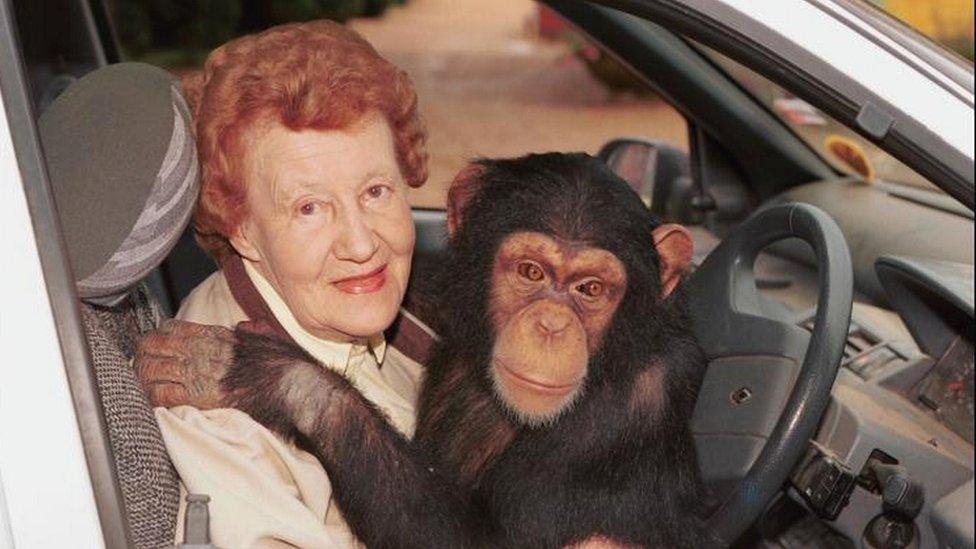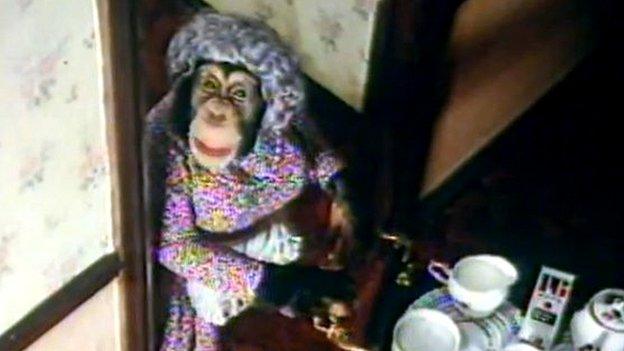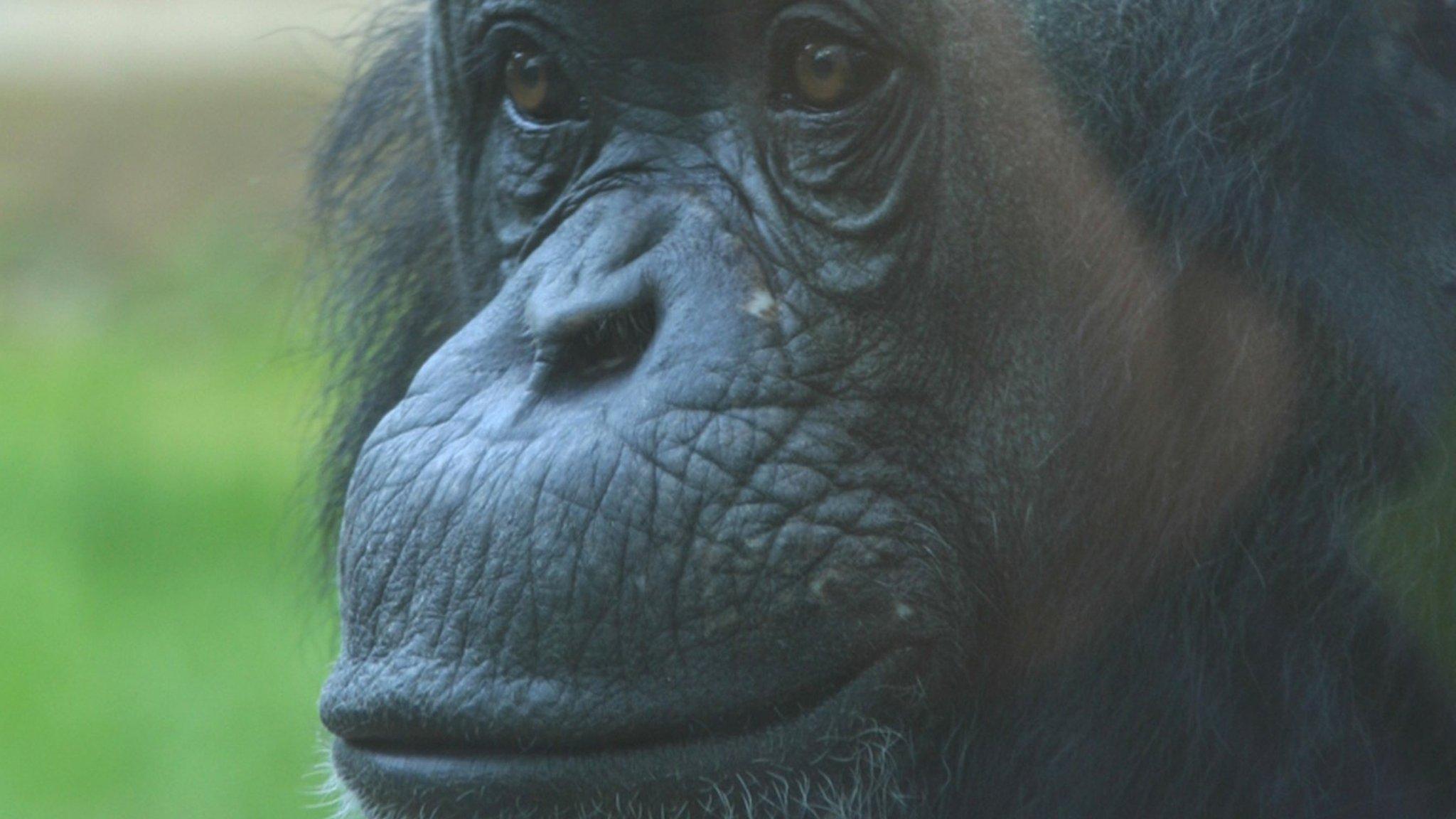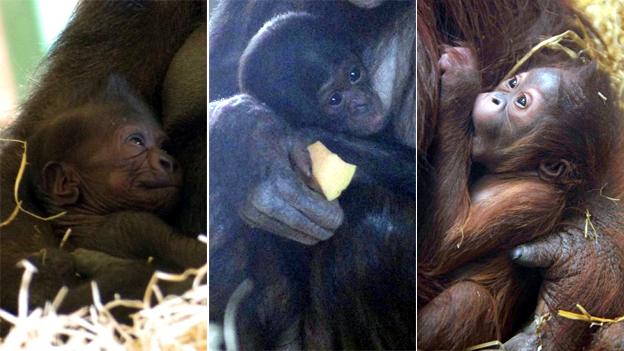Twycross Zoo 50th anniversary: Pet shop to primate centre
- Published
The origins of Twycross Zoo lie in a humble pet shop in a West Midlands town but today, as it belatedly celebrates its 50th anniversary, it has established itself as the World Primate Centre. But what does the future hold for the Leicestershire zoo?
.jpg)
Brooke became the first chimp born at Twycross Zoo in 1971 to parents Su-Su and Oscar
Molly Badham and Nathalie Evans, who ran rival pet shops in Sutton Coldfield, opened their zoo to the public on 26 May 1963, after starting a collection together in 1954, in Tamworth.
The number of animals they kept grew but despite high visitor numbers more income was needed and one way of generating the money came through its star attraction, the chimpanzees.
They were used by PG Tips to sell tea over the course of about 30 years and they also starred on Blue Peter and Tis Was, often alongside Ms Badham.
.jpg)
Twycross Zoo opened to the public 26 May 1963
Using apes for TV and entertainment is now thought to be highly damaging to the animals and even the current management of Twycross admit it was wrong to have allowed its chimps to do the work.
However, Ms Badham, who died in 2003, is credited with many things including successfully breeding animals in captivity during a time when it was difficult simply to keep them alive.
She also became a founder member of the National Federation of Zoological Gardens of Great Britain and Ireland - it later became British and Irish Association of Zoos and Aquariums (BIAZA).
Ms Badham also helped change how animals were kept in zoos across the UK.
One simple measure was giving monkeys access to grass when many parks still kept them in sterile cages with tiled floors.

Molly Badham often appeared on TV with her chimps but is credited with pioneering change in the zoo movement
Chief executive Sharon Redrobe said it was a big change that not only transformed Twycross Zoo but many other animal parks across the UK.
"It was pioneering in the early seventies and then everyone copied," said Ms Redrobe.
The decision to introduce natural floor surfaces was one of the "first step" changes in the way animals were treated and kept, she added.
It then led to bars being removed at many zoos in the 1980s and then enclosures becoming more wild, and more akin to a natural environment.
.jpg)
TV presenter Johnny Morris opened the new Gibbon Complex at Twycross Zoo in 1979
Change has been ongoing since the 1970s and Twycross has begun creating "immersive exhibits" where visitors can interact with butterflies, birds and lemurs.
However, bigger changes are afoot, and it is partly the reason why the 50th anniversary celebrations were delayed by a year.
Ms Redrobe, who only recently became the park's permanent chief executive, hopes Twycross, as one of only two zoos in the world to have all four great ape species, could become a centre of excellence - a place of study for scientists.
Ms Redrobe said: "We have the potential to be a major world player but we need investment to be [part of] the next generation of zoos."
Her ambition is to build "very large enclosures" starting with the chimpanzees and creating a "great big Eden complex" for a multi-generation and mixed-sex ape environment.
Ms Redrobe stressed that zoos have to keep evolving and since numbers of great apes, bonobos, chimps, orang-utans, and gorillas, continue to dwindle in the wild due to habitat loss, disease and hunting, the role of the modern zoo has become increasingly important.
- Published9 January 2014

- Published11 July 2013

- Published18 December 2013

- Published27 June 2013
